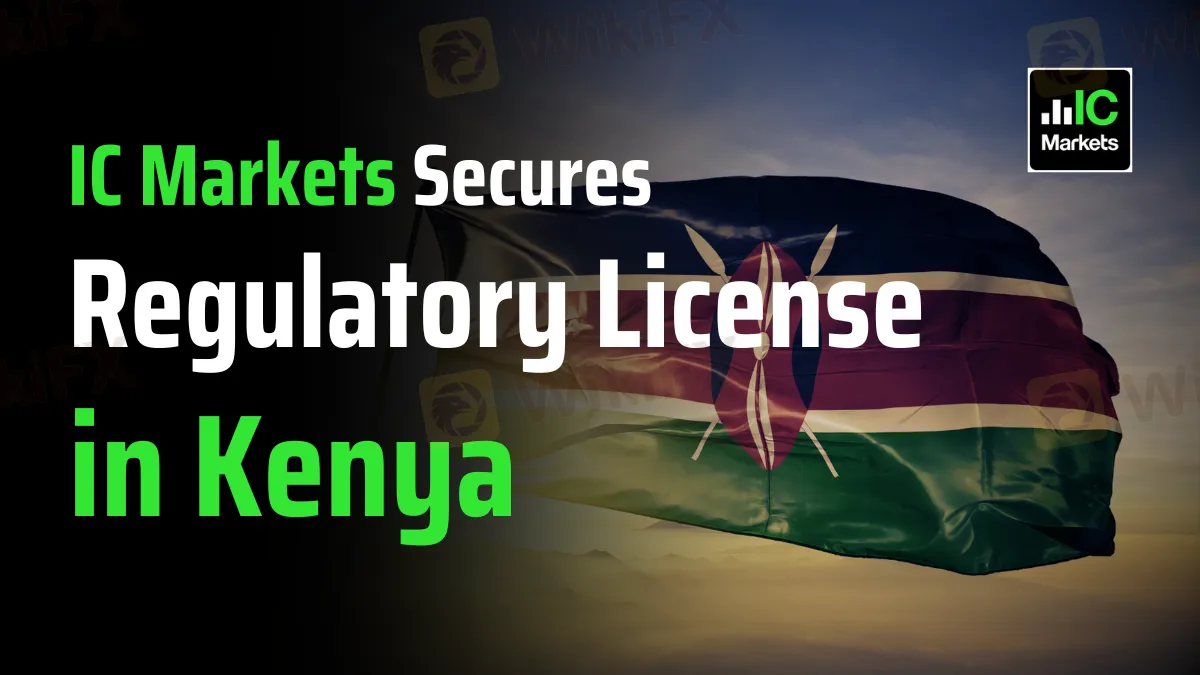简体中文
繁體中文
English
Pусский
日本語
ภาษาไทย
Tiếng Việt
Bahasa Indonesia
Español
हिन्दी
Filippiiniläinen
Français
Deutsch
Português
Türkçe
한국어
العربية
IC Markets Secures Regulatory License in Kenya
Abstract:IC Markets has obtained a license from Kenya's CMA to operate as a non-dealing online FX broker.

Leading FX and contracts for difference (CFDs) broker IC Markets has expanded globally and strengthened its position in the African financial industry by obtaining a regulatory license in Kenya. The Capital Markets Authority (CMA), Kenya's financial regulatory body, granted this license to locally registered IC Markets Kenya Limited.
The license puts IC Markets in line with other foreign retail brokers in Kenya by enabling it to operate as a non-dealing online foreign currency broker.
CMA CEO Wyckliffe Shamiah expressed confidence in the growing number of brokers wishing to get licenses in Kenya. “A good development that promotes competition, innovation, and wider access to capital markets products and services for retail investors is the growing demand for intermediary sector licenses,” Shamiah said.

This license is part of a bigger pattern that has been seen in Kenya, where the financial services industry is growing significantly as a result of the nation's strong economic growth and technical developments.
With about 54 million people and a nominal GDP of over $113 billion, Kenya is the seventh-biggest economy in Africa. Kenya appeals to retail brokers because of its growing income levels and extensive usage of mobile and internet technologies.
Being one of the few regulated companies to join this specialized market sector, IC Markets' entrance into Kenya follows its recent foray into proprietary trading services, which was launched in March.
Notwithstanding this expansion, IC Markets failed to reply by press time when Finance Magnates asked for a comment on the new licensing.
International FX and CFD brokers find the Kenyan market more and more intriguing. FP Markets, Pepperstone, Exness, Admirals, INGOT Brokers, Scope Markets, and Exinity are among the well-known companies that have established operations and obtained regulatory clearance in Kenya. This pattern emphasizes how strategically significant Kenya is as an African center for FX and CFD brokerage services.
Joining a group of esteemed companies taking advantage of Kenya's organized financial sector, IC Markets is navigating its new regulatory framework. With this move, the firm should be able to provide its expanding clientele of international customers with strong financial trading choices and improve its service offerings and market presence in Africa.

Disclaimer:
The views in this article only represent the author's personal views, and do not constitute investment advice on this platform. This platform does not guarantee the accuracy, completeness and timeliness of the information in the article, and will not be liable for any loss caused by the use of or reliance on the information in the article.
Read more

The Ultimate Guide to Automated Forex Trading in 2025
Modern markets are revolutionized by automated trading systems, which now execute 70-85% of all transactions. These advanced automated trading software solutions, commonly called trading robots or Expert Advisors (EAs), leverage algorithmic precision for automatic trading across forex, stocks, and commodities 24/7. By removing emotional interference and executing trades in microseconds, auto forex trading platforms create fair opportunities for all market participants. For those new to automated trading for beginners, these systems provide disciplined, backtested strategies while significantly reducing manual effort.

Anti-Scam Groups Urge Tougher Action on Fraudsters in UK
Anti-scam groups demand tougher police action on fraudsters as UK fraud rates surge 19%, targeting millions in a penalty-free crime spree exposed by a $35m scam leak.

Philippines Deports 29 Indonesians Linked to Online Scam Syndicate in Manila
Online scam groups in the Philippines trick Filipinos into gambling and love scams, from Manila to Bacolod, causing trafficking and pain as police fight back.

Why does your mood hinder you from getting the maximum return from an investment?
Investment decisions are rarely made in a vacuum. Aside from the objective data and market trends, our emotions—and our overall mood—play a crucial role in shaping our financial outcomes. Whether you’re feeling overconfident after a win or anxious after a loss, these emotional states can skew your decision-making process, ultimately affecting your investment returns.
WikiFX Broker
Latest News
How Crypto Trading Transforms FX and CFD Brokerage Industry
FCA Warns Against 10 Unlicensed or Clone Firms
CySEC Warns Against 14 Unlicensed Investment Websites
Top Currency Pairs to Watch for Profit This Week - March 31, 2025
Will natural disasters have an impact on the forex market?
Philippines Deports 29 Indonesians Linked to Online Scam Syndicate in Manila
Exposed: Deceptive World of Fake Trading Gurus – Don’t Get Fooled!
AI-Powered Strategies to Improve Profits in Forex Trading
Stock Market Trading Volume Drops by 97.58 Billion Naira This Month
Why does your mood hinder you from getting the maximum return from an investment?
Currency Calculator







